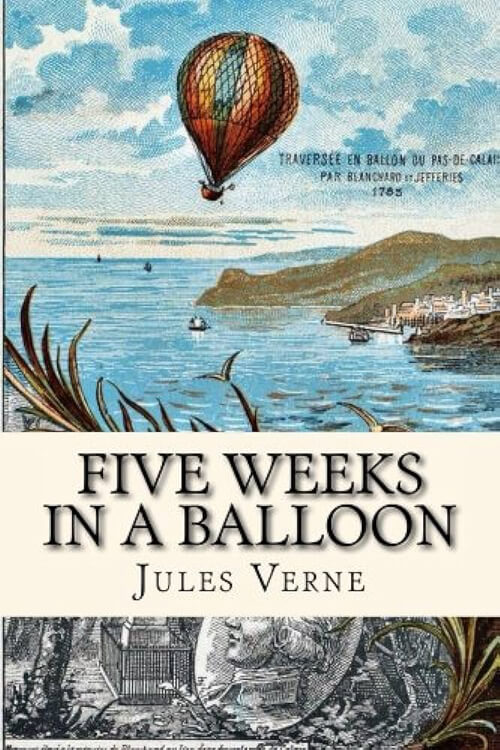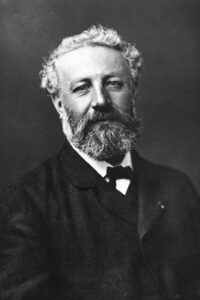
Five Weeks in a Balloon
A large audience assembled on January 14, 1862, at the session of the Royal Geographical Society, No. 3 Waterloo Place, London. The president, Sir Francis M—-, made an important communication to his colleagues in an address that was frequently interrupted by applause.
This rare specimen of eloquence terminated with the following sonorous phrases bubbling over with patriotism:
“England has always marched at the head of nations” (for, the reader will observe, the nations always march at the head of each other), “by the intrepidity of her explorers in the line of geographical discovery.” (General assent). “Dr. Samuel Ferguson, one of her most glorious sons, will not reflect discredit on his origin.” (“No, indeed!” from all parts of the hall.)
“This attempt, should it succeed” (“It will succeed!”), “will complete and link together the notions, as yet disjointed, which the world entertains of African cartology” (vehement applause); “and, should it fail, it will, at least, remain on record as one of the most daring conceptions of human genius!” (Tremendous cheering.)
“Huzza! huzza!” shouted the immense audience, completely electrified by these inspiring words.
“Huzza for the intrepid Ferguson!” cried one of the most excitable of the enthusiastic crowd.
The wildest cheering resounded on all sides. Ferguson’s name was in every mouth, and we may safely believe that it lost nothing in passing through English throats. Indeed, the hall fairly shook with it.
And there were present, also, those fearless travelers and explorers whose energetic temperaments had borne them through every quarter of the globe, many of them grown old and worn out in the service of science. All had, to some degree, physically or morally, undergone the sorest trials. They had escaped shipwreck, conflagration, Indian tomahawks, war clubs, the fagot and the stake, nay, even the cannibal maws of the South Sea Islanders. But still, their hearts beat high during Sir Francis M–-‘s address, which certainly was the finest oratorical success that the Royal Geographical Society of London had yet achieved.
But, in England, enthusiasm does not stop short of mere words. It strikes off money faster than the dies of the Royal Mint itself. So, a subscription to encourage Dr. Ferguson was voted on there and then, and it attained the handsome amount of two thousand five hundred pounds. The sum was made commensurate with the importance of the enterprise.
A member of the Society then inquired of the president whether Dr. Ferguson was not to be officially introduced.
Read or download Book
Jules Verne
Jules Gabriel Verne (8 February 1828 – 24 March 1905) was a French novelist, poet, and playwright. His collaboration with the publisher Pierre-Jules Hetzel led to the creation of the Voyages Extraordinaires, a series of bestselling adventure novels including Journey to the Center of the Earth (1864), Twenty Thousand Leagues Under the Seas (1870), and Around the World in Eighty Days (1872). His novels, always well documented, are generally set in the second half of the 19th century, considering the technological advances of the time.
In addition to his novels, he wrote numerous plays, short stories, autobiographical accounts, poetry, songs, and scientific, artistic, and literary studies. His work has been adapted for film and television since the beginning of cinema and for comic books, theater, opera, music, and video games.
Verne is considered an essential author in France and most of Europe, where he has greatly influenced the literary avant-garde and surrealism. His reputation was markedly different in the Anglosphere, where he had often been labeled a writer of genre fiction or children’s books, mainly because of the highly abridged and altered translations in which his novels have frequently been printed. Since the 1980s, his literary reputation has improved.
Since 1979, Jules Verne has been the second most translated author in the world, ranking below Agatha Christie and above William Shakespeare. He has sometimes been called the “father of science fiction,” a title that has also been given to H. G. Wells and Hugo Gernsback. In the 2010s, he was the most translated French author in the world. In France, 2005 was declared “Jules Verne Year” on the occasion of the centenary of the writer’s death.
Life
Early life
Verne was born on 8 February 1828, on Île Feydeau, a then small artificial island on the river Loire within the town of Nantes (later filled-in and incorporated into the surrounding land area), in No. 4 Rue Olivier-de-Clisson, the house of his maternal grandmother Dame Sophie Marie Adélaïde Julienne Allotte de La Fuÿe (born Guillochet de La Perrière). His parents were Pierre Verne, an attorney originally from Provins, and Sophie Allotte de La Fuÿe, a Nantes woman from a local family of navigators and shipowners of distant Scottish descent. In 1829, the Verne family moved some hundred meters away to No. 2 Quai Jean-Bart, where Verne’s brother Paul was born the same year. Three sisters, Anne “Anna” (1836), Mathilde (1839), and Marie (1842) would follow.
In 1834, at six, Verne was sent to boarding school at 5 Place du Bouffay in Nantes. The teacher, Madame Sambin, was the widow of a naval captain who had disappeared some 30 years before. Madame Sambin often told the students that her husband was a shipwrecked castaway and that he would eventually return like Robinson Crusoe from his desert island paradise. The theme of the robinsonade would stay with Verne throughout his life and appear in many of his novels, some of which include The Mysterious Island (1874), Second Fatherland (1900), and The School for Robinsons (1882).
In 1836, Verne went on to École Saint‑Stanislas, a Catholic school suiting the pious religious tastes of his father. Verne quickly distinguished himself in mémoire (recitation from memory), geography, Greek, Latin, and singing. In the same year, 1836, Pierre Verne bought a vacation house at 29 Rue des Réformés in the village of Chantenay (now part of Nantes) on the Loire. In his brief memoir Souvenirs d’enfance et de jeunesse (Memories of Childhood and Youth, 1890), Verne recalled a deep fascination with the river and with the many merchant vessels navigating it. He also took vacations at Brains, in the house of his uncle Prudent Allotte, a retired shipowner who had gone around the world and served as mayor of Brains from 1828 to 1837. Verne took joy in playing interminable rounds of the Game of the Goose with his uncle, and both the game and his uncle’s name would be memorialized in two late novels (The Will of an Eccentric (1900) and Robur the Conqueror (1886), respectively).
Literary debut
Thanks to his visits to salons, Verne came into contact with Alexandre Dumas in 1849 through the mutual acquaintance of a celebrated chirologist of the time, the Chevalier d’Arpentigny. Verne became close friends with Dumas’ son, Alexandre Dumas Fils, and showed him a manuscript for a stage comedy, Les Pailles rompues (The Broken Straws). The two young men revised the play together. Through arrangements with his father, Dumas had it produced by the Opéra-National at the Théâtre Historique in Paris, opening on 12 June 1850.
In 1851, Verne met with a fellow writer from Nantes, Pierre-Michel-François Chevalier (known as “Pitre-Chevalier”), the editor-in-chief of the magazine Musée des familles (The Family Museum). Pitre-Chevalier was looking for articles about geography, history, science, and technology and was keen to ensure that the educational component would be accessible to large popular audiences using a straightforward prose style or an engaging fictional story. With his delight in diligent research, especially in geography, Verne was a natural for the job. Verne first offered him a short historical adventure story, The First Ships of the Mexican Navy, written in the style of James Fenimore Cooper, whose novels had deeply influenced him. Pitre-Chevalier published it in July 1851, and in the same year published a second short story by Verne, A Voyage in a Balloon (August 1851). With its combination of adventurous narrative, travel themes, and detailed historical research, Verne would later describe the latter as “the first indication of the line of novel that I was destined to follow.”
Dumas fils put Verne in contact with Jules Seveste, a stage director who had taken over the directorship of the Théâtre Historique and renamed it the Théâtre Lyrique. Seveste offered Verne the job of secretary of the theater with little or no salary attached. Verne accepted, using the opportunity to write and produce several comic operas in collaboration with Hignard and the prolific librettist Michel Carré. To celebrate his employment at the Théâtre Lyrique, Verne joined ten friends to find a bachelors’ dining club, the Onze-sans-femme (Eleven Bachelors).






